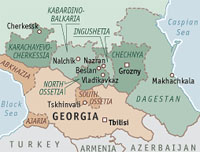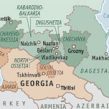
ADYGEI LEADER PURSUES DE FACTO INCORPORATION INTO KRASNODAR KRAI
Publication: Eurasia Daily Monitor Volume: 4 Issue: 97
By:

Adygeya, a small ethnic republic in the western North Caucasus, attracted attention in late 2004, when some regional and federal officials suggested merging it with Krasnodar Krai, an ethnic Russian-dominated neighbor (see EDM, April 6, 29, 2005). The proposal has been strongly resisted in Adygeya.
Adygei society, led by President Khasret Sovmen, demanded that the Kremlin and Krasnodar authorities drop the plans for unification (see EDM, April 6, 10, 2006). However, talks on the possible unification are still ongoing, although there is evidence that the Russian authorities are becoming more flexible about how to implement it. From time to time the Kremlin tests the Adygeis’ determination to defend their ethnic autonomy.
Late last year the Kremlin replaced Sovmen with Aslan Tkhakushinov, a loyalist who is ready to follow any instructions that come from Moscow. The appointment of Tkhakushinov coincided with another federal attack against the republic’s sovereignty. Several Adygei state structures, such as the agencies overseeing veterinary and phytosanitary standards, the press, roads, and narcotics were placed under the authority of Krasnodar Krai. The Adygei Customs Agency was disbanded and the Adygei Ministry of Interior Affairs was downgraded to a branch of the Russian Ministry of Interior Affairs.
Nevertheless, the resistance of the Adygeis forced the Kremlin to stop the process of transferring the governing bodies to Krasnodar Krai. On December 7, 2006, a delegation from the Adygei parliament met in Moscow with Dmitry Kozak, Russian President Vladimir Putin’s envoy to the Southern Federal District, who told the deputies that he had not heard anything about any changes in the status of Adygeya. When Putin declared that the issue of the incorporation of Adygeya into Krasnodar Krai had been closed, Kozak admitted that some republican administration bodies had indeed been transferred, but for financial rather than political reasons.
After that, Tkhakushinov declared that unification was not on the agenda. On December 14, Tkhakushinov said that the borders of Adygeya were untouchable and on January 15, the day after his inauguration, he said any talk of possible mergers was a “provocation” and promised not to raise this issue again (Kavkazky uzel, January 15).
However, he did call for further economic integration with Krasnodar Krai (Regnum, December 14, 2006). His first act as president was to russify the local government. He announced that key posts in the government would be occupied by local Russians to maintain an “inter-ethnic balance” (Kavkazky uzel, December 14, 2006). On December 21, Tkhakushinov appointed Vladimir Samozhenkov, an ethnic Russian, as prime minister, and Egor Gorayanov, a Russian who had worked in the republican Prosecutor’s Office, head of his administration. Other posts in the government were divided between Russians and Adygeis.
During the first month of his presidency Tkhakushinov visited Krasnodar, Karachaevo-Cherkessia, and Volgograd to look for potential investors. His main focus, however, was Krasnodar. “Economic integration with neighboring regions is the main condition for the development and survival of Adygeya,” he declared. Tkhakushinov argued that the republic cannot develop its agriculture, industry, and tourism without help from Krasnodar Krai (yuga.ru, March 22).
It looks like Tkhakushinov wants to convince observers that Adygeya cannot exist without Krasnodar Krai. To strengthen this impression, the Adygei president gives more interviews to Krasnodar media than anybody else. In an interview with the Krasnodar edition of Komsomolskaya pravda, Tkhakushinov said that the development of Adygeya, especially of its tourist resorts, would benefit Krasnodar Krai (Komsomolskaya pravda-Kuban, March 22).
Tkhakushinov’s main economic projects are oriented toward Krasnodar. In an April 13 interview with Interfax-Yug, the president called for the joint development of Adygeya’s tourist resorts by the authorities of the two regions. Specifically, Tkhakushinov wants to develop the resorts based in the mountains near the Black Sea coast. Other projects are planned for areas that border Krasnodar. The administration of the Teuchezky district in Adygei has signed an economic cooperation agreement with Krasnodar’s Karasunsky district (Regnum, January 10). An IKEA store will be built in Takhtamukaisky district, which could lead to a land shortage and the absorption of an Adygei village into Krasnodar (Kavkazky uzel, March 15).
The economic policy of the new Adygei government demonstrates that it is doing more to benefit Krasnodar than Adygeya. Instead of developing its own tourist infrastructure, the Adygei leadership wants to link to Krasnodar facilities. Instead of developing the republican capital, building a railroad station, an airport, and highways that go directly to the republic, the regional authorities focus on joint economic projects with Krasnodar, projects that will allow Krasnodar to control Adygeya’s main roads to the Black Sea, making the republic even more dependent on its neighbor.
However, Tkhakushinov does not confine himself to economic integration. He has also taken some steps toward a political rapprochement between the two regions. Last March he met leaders of the Krasnodar Cossacks and promised them full support for their activities in Adygeya (Kavkazky uzel, March 13). Tkhakushinov has openly supported Alexander Tkachev, the governor of Krasnodar, asking Putin to appoint him for another term.
Against the background of such pro-Krasnodar policy, Adygeya’s sovereignty continues to evaporate. During the first four months of Tkhakushinov’s presidency, he moved to repeal the local law making the learning of the Adygei language compulsory, dropped the regional constitution day as a holiday, and ignored requests from the international Circassian Diaspora to help Adygeis who live abroad and want to return to Adygeya.
The Kremlin appears to be using Tkhakushinov to implement a softer strategy, namely Adygeya’s de facto incorporation into Krasnodar Krai.




